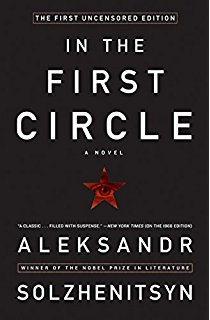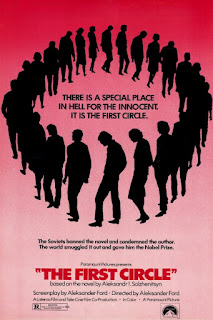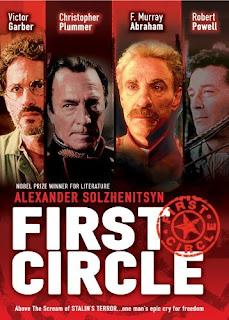Artificially Created Prison
By Alexander Solzhenitsyn
Translated By Harry T. Willetts
Russian, 1968, 2009
Semi-Autobiographical, Political
Main Attractions
1. Logically Structured Lit.
2. Incredibly Human Characters
3. Moments of Dark Humour
4. Intelligent, Philosophical Banter
5. Artificially Imposed Prison Theme
6. Scenes of Emotional Intensity
7. A Variety of Meaningful Parables
8. Surprisingly Comical At Times
9. Shockingly Little Violence
10. It all Leads up to the End
Cuisine & Delicacies
Ranked as: Steak
The lively, intelligent dialogue with numerous references to other great classics makes this such a joy to read. We become attached the character then we learn about his life before prison so we become attached to him even more. All of these scenes of a more peaceful time adds such flavour to an otherwise intellectually stimulating book. The book is also loaded up with parables of wisdom & some brief monologues in a modern Shakespearian format. The title is borrowed from a line in Dante’s Divine Comedy, The Inferno section. So there are allusions to the setting of In the First Circle as being a kind of Dantean Hell. Solzhenitsyn incorporates so many different writing skills into one book that makes it a joy to read, in spite of the heavy subject matter.
Destination Summary
This book follows the lives of a variety of prisoners for 1 week. It slowly reveals their life histories & their current roles in the research work camp. The prison lives of these zeks are wildly different from the more well known hard labour camps. These men are physically imprisoned but it’s their minds and academic backgrounds that are enslaved for the development of Soviet technology. Because they are so highly educated, their discussions with each other are lively & filled with wisdom. Solzhenitsyn shows us the variety of ways men can cope in a stressful situation & he touches on how these men’s marriages are affected.
Off the Beaten Path
An 11 min clip explaining Solzhenitsyn’s personal experiences in Communism and his 180 change from supporting it to loathing it as the worst social illness.
The Gulag Archipelago and The Wisdom of Aleksandr Solzhenitsyn By Academy of Ideas
Packing List
✓ Sleeping Bag & Flickering Flashlight
✓ Tin Prison Cup & Crackling Radio
✓ Letter Writing Set to Share With Loved Ones
Recommended Resources
Alternate Books
✓ One Day in the Life of Ivan Denisovich By Aleksandr Solzhenitsyn (1962) - This is a compelling novella that’s also a great precursor to all of Solzhenitsyn’s masterpieces, especially In the First Circle. It focuses on just one character & his thoughts for just one day.
✓ Notes from a Dead House By Fyodor Dostoevsky (1862) - This writing style cannot be more different than Solzhenitsyn’s more upbeat, optimistic approach. It deals with Czarist Gulags but from a prisoner’s psychology point of view with all the darkness we can expect from Dostoevsky’s writing.
✓ Les Miserables By Victor Hugo (1862) - This one also uses a variety of characters to reveal a revolutionary story & just how many different types of social prison there are.
Movie Adaptations
✓ In the First Circle Mini-Series (2006) Directed by Gleb Panfilov - This is a recent Russian language adaptation.
✓ In the First Circle (1973) Directed by Aleksander Ford - A slightly older Russian language movie adaptation
✓ The First Circle (1992) Directed by Sheldon Larry - An English language adaptation filmed in Montreal, Paris & Moscow.
By Alexander Solzhenitsyn
Translated By Harry T. Willetts
Russian, 1968, 2009
Semi-Autobiographical, Political
Main Attractions
1. Logically Structured Lit.
2. Incredibly Human Characters
3. Moments of Dark Humour
4. Intelligent, Philosophical Banter
5. Artificially Imposed Prison Theme
6. Scenes of Emotional Intensity
7. A Variety of Meaningful Parables
8. Surprisingly Comical At Times
9. Shockingly Little Violence
10. It all Leads up to the End
Cuisine & Delicacies
Ranked as: Steak
The lively, intelligent dialogue with numerous references to other great classics makes this such a joy to read. We become attached the character then we learn about his life before prison so we become attached to him even more. All of these scenes of a more peaceful time adds such flavour to an otherwise intellectually stimulating book. The book is also loaded up with parables of wisdom & some brief monologues in a modern Shakespearian format. The title is borrowed from a line in Dante’s Divine Comedy, The Inferno section. So there are allusions to the setting of In the First Circle as being a kind of Dantean Hell. Solzhenitsyn incorporates so many different writing skills into one book that makes it a joy to read, in spite of the heavy subject matter.
Destination Summary
This book follows the lives of a variety of prisoners for 1 week. It slowly reveals their life histories & their current roles in the research work camp. The prison lives of these zeks are wildly different from the more well known hard labour camps. These men are physically imprisoned but it’s their minds and academic backgrounds that are enslaved for the development of Soviet technology. Because they are so highly educated, their discussions with each other are lively & filled with wisdom. Solzhenitsyn shows us the variety of ways men can cope in a stressful situation & he touches on how these men’s marriages are affected.
Off the Beaten Path
An 11 min clip explaining Solzhenitsyn’s personal experiences in Communism and his 180 change from supporting it to loathing it as the worst social illness.
The Gulag Archipelago and The Wisdom of Aleksandr Solzhenitsyn By Academy of Ideas
Packing List
✓ Sleeping Bag & Flickering Flashlight
✓ Tin Prison Cup & Crackling Radio
✓ Letter Writing Set to Share With Loved Ones
Recommended Resources
Alternate Books
✓ One Day in the Life of Ivan Denisovich By Aleksandr Solzhenitsyn (1962) - This is a compelling novella that’s also a great precursor to all of Solzhenitsyn’s masterpieces, especially In the First Circle. It focuses on just one character & his thoughts for just one day.
✓ Notes from a Dead House By Fyodor Dostoevsky (1862) - This writing style cannot be more different than Solzhenitsyn’s more upbeat, optimistic approach. It deals with Czarist Gulags but from a prisoner’s psychology point of view with all the darkness we can expect from Dostoevsky’s writing.
✓ Les Miserables By Victor Hugo (1862) - This one also uses a variety of characters to reveal a revolutionary story & just how many different types of social prison there are.
Movie Adaptations
✓ In the First Circle Mini-Series (2006) Directed by Gleb Panfilov - This is a recent Russian language adaptation.
✓ In the First Circle (1973) Directed by Aleksander Ford - A slightly older Russian language movie adaptation
✓ The First Circle (1992) Directed by Sheldon Larry - An English language adaptation filmed in Montreal, Paris & Moscow.




Comments
Post a Comment